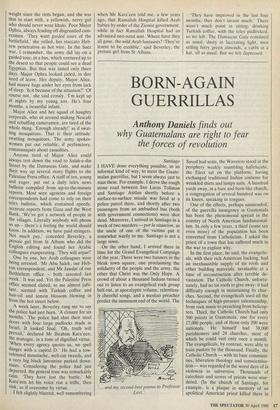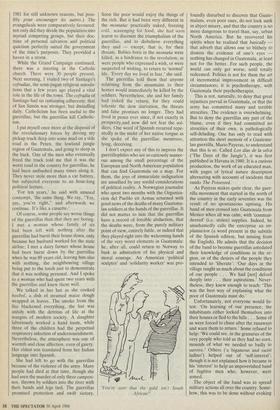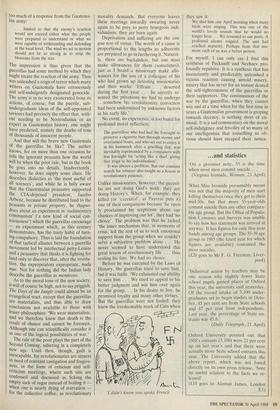BORN-AGAIN GUERRILLAS
Anthony Daniels finds out why Guatemalans are right to fear the forces of revolution Santiago I HAVE done everything possible, in an informal kind of way, to meet the Guate- malan guerrillas, but I seem always just to miss them. For example, I drove the rough stone road between San Lucas Toliman and Santiago Atitlan shortly before a surface-to-surface missile was fired at a police patrol there, and shortly after two passengers from an ambushed bus (both with government connections) were shot dead. Moreover, I arrived in Santiago in a week of two murders— por la situacion, as the uncle of one of the victims put it somewhat warily to me. Santiago is not a large town.
On the other hand, I arrived there in time for the Grand Evangelical Campaign of the year. There were two banners in the bleak town square, one proclaiming the solidarity of the people and the army, the other that Christ was the Only Hope. A crowd of about a thousand Indians turned out to listen to an evangelical rock group belt out, at apocalyptic volume, relentless- ly cheerful songs, and a mestizo preacher predict the imminent end of the world. The
' ... and my second-best poems to Professor Levi.'
Saved had seats, the Waverers stood at the periphery weakly mumbling hallelujahs, the Elect sat on the platform, having exchanged traditional Indian costume for wrinkled shirts and lumpy suits. A hundred yards away, in a bare and barn-like church, a congregation of several hundred was on its knees, speaking in tongues.
One of the effects, perhaps unintended, of the guerrilla insurgency in Guatemala has been the phenomenal spread in the country of North American fundamental- ism. In only a few years, a third (some say even more) of the population has been converted from Catholicism. I asked the priest of a town that has suffered much in the war to explain why.
In the first place, he said, the evangelic- als, with their rich American backing, had an inexhaustible supply of tin roofs and other building materials, invaluable at a time of reconstruction after terrible de- vastation. The Catholic Church, unfortu- nately, had no tin roofs to give away: it had difficulty enough in maintaining its chur- ches. Second, the evangelicals used all the techniques of high-pressure salesmanship, from rock music to preaching from helicop- ters. Third, the Catholic Church had only 500 priests in Guatemala, one for every 17,000 people, and of those only 200 were nationals. He himself had 38,000 parishioners and 24 churches, most of which he could visit only once a month. The evangelicals, by contrast, were able to train pastors by the thousand. Finally, the Catholic Church — with its base communi- ties, liberation theology and conscientisa- tion — was regarded in the worst days of /a violencia as subversive. Thousands of catechists and scores of priests were mur- dered. (In the church of Santiago, for example, is a plaque in memory of an apolitical American priest killed there in 1981 for still unknown reasons, but poss- ibly pour encourager les autres.) The evangelicals were comparatively favoured: not only did they divide the population into myriad competing groups, but their doc- trine of personal salvation and political quietism perfectly suited the government of the time's purposes. They provided a haven in a storm.
While the Grand Campaign continued, there was a meeting in the Catholic church. There were 30 people present. Next morning, I visited two of Santiago's cofradias, the semi-pagan religious associa- tions that a few years ago played a vital role in the life of the town. The cofradia of Santiago had six remaining adherents; that of San Sim6n was stronger, but dwindling daily. Catholicism has been useful to the guerrillas; but the guerrillas kill Catholic- ism.
I put myself once more at the disposal of the revolutionary forces by driving my pickup truck deep into some mud on a side road in the Peten, the lowland jungle region of Guatemala, and going to sleep in the back. One of the men who eventually freed the truck told me that it was the worst road in the country for guerrillas, he had been ambushed many times along it. They never stole more than a car battery, but subjected everyone to an hour-long political lecture.
'For ten years,' he said with amused contempt, 'the same thing. We say, "Yes, yes, you're right," and afterwards we continue. It's like a cassette.'
Of course, some people say worse things of the guerrillas than that they are boring. I met a woman whose family of six had been left with nothing after the guerrillas had burnt their house down, only because her husband worked for the state airline; I met a dairy farmer whose house had been burnt down by the guerrillas when he was 89 years old, leaving him also with nothing, the neighbouring village being put to the torch just to demonstrate that it was nothing personal. And I spoke to a woman who had spent two years with the guerrillas and knew them well.
We talked in her hut as she cooked boxbol, a dish of steamed maize dough wrapped in leaves. The smoke from the fire blackened everything, the hut was untidy with the detritus of life at the margins of modern society. A daughter laboriously worked a hand loom, while three of the children had the perpetual respiratory infection of undernourishment. Nevertheless, the atmosphere was one of warmth and close affection, even of gaiety. Her eldest son translated from her Indian language into Spanish.
She had left to go with the guerrillas because of the violence of the army. Many people had died at that time, though she had seen the murder of only three campesi- nos, thrown by soldiers into the river with their hands and legs tied. The guerrillas promised protection and swift victory. Soon the poor would enjoy the things of the rich. But it had been very different in the montaria: practically naked, freezing cold, scavenging for food, she had soon learnt to discount the triumphalism of the guerrillas, and to disbelieve everything they said — except, that is, for their threats. Babies born in the montaria were killed, as a hindrance to the revolution; as were people who expressed a wish, or were suspected of wishing, to return to 'normal' life. 'Every day we lived in fear,' she said.
The guerrillas told them that anyone returning from the mountains to their homes would immediately be killed by the soldiers. Nevertheless, she and her family had risked the return, for they could tolerate the slow starvation, the threats and false promises no longer. They had lived in peace ever since, if not exactly in prosperity ,and now did not fear the sol- diers. One word of Spanish recurred repe- atedly in the midst of her native tongue as she spoke of the guerrillas: mentiroso, lying, deceiving.
I don't expect any of this to impress the guerrillophiles who are so curiously numer- ous among the small percentage of the European and North American population that can find Guatemala on a map. For them, the joys of immaculate indignation are unsullied by any sordid considerations of political reality. A Norwegian journalist who spent two months with the Organiza- cion del Pueblo en Armas returned with good news of the deaths of many Guatema- lan soldiers at the hands of the guerrillas. It did not matte' to him that the guerrillas have a record of forcible abduction, that the deaths were, from the purely military point of view, entirely futile, or indeed that they played right into the welcoming hands of the very worst elements in Guatemala: he, after all, could return to Norway to bask in admiration of his physical and moral courage. An American 'political sculptor' and 'solidarity worker' was pro- 'You're sure that the gold isn't Sot t African?' foundly disturbed to discover that Guate- malans, even poor ones, do not look sunk in abject misery, and that the country is no more dangerous to travel than, say, urban North America. But he recovered his spirits when he realised that basically — that adverb that allows one so blithely to dismiss the evidence of one's eyes — nothing has changed in Guatemala, at least not for the better. For such people, the world can only get worse, until totally redeemed. Politics is not for them the art of incremental improvement in difficult circumstances; it is psychotherapy, with Guatemala their psychotherapist.
This is not, naturally, to deny that great injustices prevail in Guatemala, or that the army has committed many and terrible atrocities. The evidence is overwhelming. But to deny the guerrillas any part of the blame, even if they had committed no atrocities of their own, is pathologically self-deluding. One has only to read with attention the short memoir of a Guatema- lan guerrilla, Mario Payeras, to understand that this is so. Called Los clias de la selva (`The Days of the Jungle'), it was first published in Havana in 1980. It is a curious production, the work of an educated man, with pages of lyrical nature description alternating with accounts of incidents that outdo The Possessed.
As Payeras makes quite clear, the guer- rilla movement that started in the north of the country in the early seventies was the result of no spontaneous uprising. His band of men crossed into Guatemala from Mexico when all was calm, with 'comman- deered' (i.e. stolen) supplies. Indeed, he unashamedly calls the enterprise an im- plantacion (a word present in the subtitle of the Spanish edition, but missing from the English). He admits that the decision of the band to become guerrillas antedated their knowledge of conditions in the re- gion, or of the desires of the people they intended to 'liberate': 'Our days in the village taught us much about the conditions of our people . . . We had [not] delved deeply into . . their aspirations.' Never- theless, they knew enough to teach: 'This was the best way of explaining what the poor of Guatemala must do.'
Unfortunately, not everyone would lis- ten: 'On learning of our presence, the inhabitants either locked themselves into their houses or fled to the hills. . . Some of us were forced to chase after the runaways and warn them to return.' Some refused to help: 'We could see, in the granaries of the very people who told us they had no corn, mounds of what we needed so badly to survive.' Others Ca bigamous and racist ladinol helped out of 'self-interest'; though it is not explained how it became in his 'interest' to help an impoverished band of fugitive men who, however, were armed.
The object of the band was to spread military actions all over the country. Some- how, this was to be done without evoking too much of a response from the Guatema- lan army:
. . . limited so that the enemy's reaction would not exceed either what the people were prepared to understand or what we were capable of withstanding and defending at the local level. The wind we set in motion should not be so strong as to strip the blossoms from the tree.
The impression is thus given that the guerrillas had some method by which they might titrate the reaction of the army. Thus was unleashed a reign of terror which many writers on Guatemala have erroneously and self-indulgently designated genocide. The army is in no way exonerated from its actions, of course; but the puerile, sub- undergraduate ideas of the self-appointed saviours had precisely the effect that, with- out needing to be Nostrodamus or an expert in Guatemalan history, one might have predicted, namely the deaths of tens of thousands of innocent people.
And that will the brave new Guatemala of the guerrillas be like? The author knows, for on more than one occasion he tells the ignorant peasants how the world Will be when the poor rule, but in the book he goes into no details. Inadvertently, however, he does supply some clues. He describes dialectics as 'the most useful of all sciences.; and while he is fully aware that the Guatemalan peasantry supported the CIA-deposed president, Jacobo Arbenz, because he distributed land to the Peasants in private property, he rhapso- dises about an experiment in 'rudimentary communism' Ca new kind of social con- sciousness') which the guerrillas encourage — an experiment which, as this century demonstrates, has the nasty habit of turn- ing compulsory. Thus is laid the foundation of that tactical alliance between a guerrilla Movement led by intellectual petty-Lenins and a peasantry that thinks it is fighting for land only to discover that, after the revolu- tion, the expropriators expropriate, nada mas. Not for nothing did the Indian lady describe the guerrillas as mentiroso. As to the moral tone of the new society, it will of course be high, not to say priggish. The Days of the Jungle could almost be an evangelical tract, except that the guerrillas are materialists, and thus able to draw conclusions not available to those with lesser philosophies: 'We were materialists, and we therefore knew that death is the result of chance and cannot be foreseen. Although one can scientifically consider it as one of the logical possibilities of war.'
The rule of the poor plays the part of the Second Coming, ushering in a completely new age. Until then, though, guilt is inescapable, for revolutionaries are sinners in need of constant castigation and forgive- ness, in the form of criticism and self- criticism meetings, where such sins are Confessed and discussed as licking the empty sack of sugar instead of boiling it — When one is nearly dying of starvation — for the collective coffee, as revolutionary morality demands. But everyone leaves these meetings inwardly swearing never again to be prey to petty bourgeois indi- vidualism: they are born again.
Deprivation and suffering are the sine qua non of virtue. The worth of a cause is proportional to the lengths its adherents are prepared to go in furthering it. Natural- ly, there are backsliders, but one must make allowances for them (sometimes), just as I heard a missionary make allo- wances for the son of a colleague of his who had grown up detesting missionaries and their works: `Effrain . . . deserted during the first year . . . he secretly re- sented the privations we had to undergo ...somehow his revolutionary conviction had been undermined by unknown factors in his early life.'
No event, no experience, is too banal for profound moral reflection:
The guerrillero who had had the foresight to preserve a cigarette butt through storms and overturned boats, and who set out to enjoy it in his hammock after a gruelling day, was inevitably reprimanded by a compariero with less foresight for 'acting like a thief, giving free reign to his individualism'.
It was always a problem. But our constant search for tobacco also taught us a lesson in revolutionary patience.
Unlike missionaries, however, the guerril- las are not doing God's work: they are doing History's. When, for example, they killed (or 'executed', as Payeras puts it) one of their companions because 'he open ly proclaimed his scepticism about our chances of improving our lot', they had 'no choice'. The problem was that he lacked 'the inner mechanism that, in moments of crisis, led the rest of us to seek emotional support from the group when we couldn't solve a subjective problem alone . . . He never seemed to have understood this great lesson of revolutionary life . . . thus sealing his fate. We had no choice.
Before he was executed by the Laws of History, the guerrillas tried to save him, but it was futile. 'We exhausted our abililty to save him . . . We tried to appeal to his better judgment and win him over again for the group. . . In his desire to live, he promised loyalty and many other virtues.' But the guerrillas were not fooled: they knew the irredeemable mark of Cain when 'I didn't know you spoke French.' they saw it:
We shot him one April morning when many birds were singing. This was one of the world's lovely sounds that he would no longer hear. . . We returned to our posts. A profound silence reigned. The unit had reached maturity. Perhaps from that mo- ment each of us was a better person.
For myself, I can only say I find this synthesis of Pecksniff and Nechaev pro- foundly repulsive. It is a synthesis that has insouciantly and predictably unleashed a vicious reaction causing untold misery, misery that has never for an instant dented the self-righteousness of the guerrillas or their supporters. The continuation of the war by the guerrillas, when they cannot win and at a time when for the first time in years a Guatemalan government is groping towards decency, is nothing short of cri- minal. It is a sad commentary on the moral self-indulgence and frivolity of so many of our intelligentsia that something so ob- vious should have escaped their notice.




























































 Previous page
Previous page